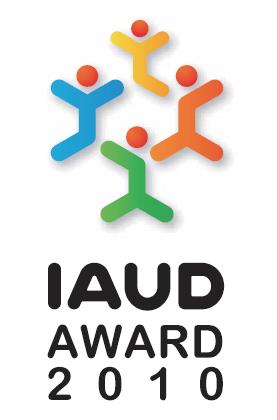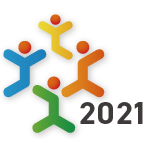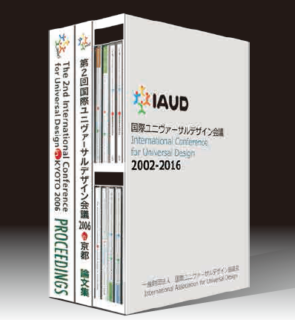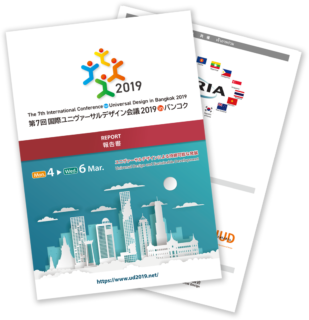Announcing the Grand Award and Excellence Awards in IAUD Award 2010
2010.12.14 Updated
 The IAUD Award 2010 attracted 28 entrants from 5 countries (6 from overseas), and after rigorous and fair evaluation by the Selection Committee, four winners were selected for the Excellent Awards in October 2010. At the 3rd International Conference for Universal Design in Hamamatsu 2010, the winner of the Grand Award was chosen from among the Excellent Award winners. The award ceremony was also held at the conference and each of the winners gave presentations.
The IAUD Award 2010 attracted 28 entrants from 5 countries (6 from overseas), and after rigorous and fair evaluation by the Selection Committee, four winners were selected for the Excellent Awards in October 2010. At the 3rd International Conference for Universal Design in Hamamatsu 2010, the winner of the Grand Award was chosen from among the Excellent Award winners. The award ceremony was also held at the conference and each of the winners gave presentations.
IAUD Award 2010, the Grand Award (1 winner)
- The Creation of a Non-Handicapping Environment for Persons with Disabilities in Rural Areas in the Philippines (creation of communities friendly to people with disabilities)
- Overview
- The National Council on Disability Affairs (NCDA) Philippines and Japan International Cooperation Agency (JICA) have launched a joint project to improve physical access for people with disabilities through the restoration of public facilities and social access through the empowerment of people with disabilities. The project aims to expand the Non-Handicapping Environment both in the Philippines and overseas by providing training for people involved in the project including the counterparts of this project, people with disabilities and the self-help groups and organizations of people with disabilities. In addition, it will promote networking activities as well as awareness and protection of human rights with the goal of changing the social environment. The project will take place over a period of four years (October 2008 – September 2012) in two municipal local governments in the rural areas in the Philippines: 1) New Lucena, Iloilo Province, Panai and 2) Opol, Misamis Oriental Province, Mindanao).
- Japan International Cooperation Agency (JICA), National Council on Disability Affairs (NCDA), Philippines
Reference (JICA website): http://www.jica.go.jp/topics/2010/20101117_02.html
IAUD Award 2010, Excellent Awards (3 winners)
- Promotion of “DOCOMO Hearty Style”
- Overview
- Based on the concept of universal design, which pursues the objective of providing products and services that are easy for all persons to use, we at NTT DOCOMO are energetically working on activities we call "DOCOMO Hearty Style" to bring more warmth into our relations with customers based on the three focal points of "products," "customer service centers," and "services."
- NTT DoCoMo, Inc.
- Experience Universal Design with Five Senses ― Developing Architectural Space Experiment Conducted at South Alps Health & Welfare Center―
- Overview
- Architecturization of the concept of affordance; our senses of touch, hearing and vision
-
1. Lead line:
Create a line by changing wallpaper materials, follow it to gain access to what you need; a doorknob, push stick or power source.-
2. Lead echo:
change the height of the top light, and differences in echo sounds and light will help you recognize your location.-
3. Emphasized visibility in interior designing:
visitors are guided to their destinations by the signs differentiated by four colors according to directions and floor patterns
- NIKKEN SEKKEI LTD.
- Building a System Model that Offers Mobility Assistance Information to Support Users of Public Transportation
- Overview
- We provide barrier-free maps of subway stations around the country on the web to meet the pressing needs for barrier-free information of public transportation and also try to make them available from mobile devices and on printed pamphlets. We improve the maps and booklets from the Universal Design perspective based on the user evaluation and promote the availability of barrier-free information in cooperation with other companies.
- Nonprofit Organization Town Guidance Support Network
Award Ceremony
The award ceremony for the IAUD Award 2010 was held on Day 3 of the 3rd International Conference for Universal Design in Hamamatsu 2010 (November 1). Following the announcement of the winner of the Grand Award, IAUD President Takuma Yamamoto presented the awards.
|
|
|
| Grand Award: Japan International Cooperation Agency (JICA), National Council on Disability Affairs (NCDA), Philippines | Excellent Awards: NTT DoCoMo, Inc. |
|
|
|
| Excellent Awards: Nonprofit Organization Town Guidance Support Network | Excellent Awards: NIKKEN SEKKEI LTD. |
Comments by the Selection Committee Chairman
Following the presentation of the award certificates, Professor Roger Coleman, Chairman of the IAUD Award Selection Committee, gave a review of the entries of the IAUD Award 2010.
“On behalf of the selection committee, I would like to make a few comments about the entries of the IAUD Award 2010. First of all, the overall quality of entries was extremely high, making our selection very difficult. In content too, there was a wide variety including projects undertaken by individuals and large-scale programs presented by major corporations. The fields covered by the entries were also rich in diversity, from design research and training to practical user-driven initiatives from local communities. The judges were particularly impressed by the variety of universal design aspects reflected in the entries as a whole, including drawings, signs and designs as well as projects that were innovative even from a global perspective. At the same time, there were many practical entries of projects coming from local communities. In the end we had to narrow our selection to the following four organizations as the winners of the Excellence Awards but the high standard of the entries made our selection very difficult.
First of all, I will begin with the corporate winners.
The design quality of the case study entered by Nikken Sekkei Ltd. was outstanding. The dissemination of Universal Design thinking and practice within a very large professional group is likely to prove extremely influential. And the focus on lighting and acoustics marks this design out as genuinely holistic. We hope that this forward-looking project is the beginning of a wider dissemination of UD theory and practice outside the company.
The entry from NTT DoCoMo clearly demonstrates an established process of continuous design improvement within a world-leading company. This process delivers special features that include specific groups of users and others that offer benefits to all. The jury was particularly impressed with the strong focus on inclusive customer service through the design and staffing of sales outlets. These outlets will provide best-practice examples on high streets across Japan, effectively raising the bar in store design and inclusive customer service. In this regard NTT DoCoMo is outstanding in relation to its international peers in the industry, in that it is committed to the value of what we might call 'high touch' in telecommunications when its peers are going in the other direction and reducing customer contact to a minimum.
The Town Guidance Support Network has identified a crucial gap in transport provision: the lack of appropriate and integrated information to enable users of all ages and abilities to seamlessly navigate between transport systems and different operators. Well-researched design solutions have been proposed and implemented with a wide range of service operators and facility managers. The jury saw this entry as genuinely universal with real potential for much wider scale application. Importantly too, it was bottom-up and user driven. The knowledge and applications developed by the Town Guidance Support Network could be readily transferred to other countries offering real opportunities to significantly increase the use of public transport.
We had a very hard job choosing between this fine example of self-empowerment and the overall winning entry from the Japan International Cooperation Agency (JICA). The JICA entry was at first sight more focused on barrier-free access and wheelchair users than the other entries and not therefore strictly-speaking Universal Design.
However, in developed areas like the United States and Europe, early initiatives were in barrier-free design and the progress to Universal Design has taken some time. In our view this is the level at which work has to start in rural areas and in countries like the Philippines and so in this case the barrier-free focus was not seen as a drawback. On the contrary, what particularly impressed us case was the process of knowledge transfer from the 'haves' to the 'have-nots'. In that sense it is a world-class demonstration project at the level of international collaboration in the promotion of disability rights and unique among the Award entries in addressing the pressing need for accessibility in poorer rural areas. Most importantly it does so by promoting equity and empowering users to speak, think and campaign for them.
However, in developed areas like the United States and Europe, early initiatives were in barrier-free design and the progress to Universal Design has taken some time. In our view this is the level at which work has to start in rural areas and in countries like the Philippines and so in this case the barrier-free focus was not seen as a drawback. On the contrary, what particularly impressed us case was the process of knowledge transfer from the 'haves' to the 'have-nots'. In that sense it is a world-class demonstration project at the level of international collaboration in the promotion of disability rights and unique among the Award entries in addressing the pressing need for accessibility in poorer rural areas. Most importantly it does so by promoting equity and empowering users to speak, think and campaign for them.
The promotion of equity is a central concept and driver for Universal Design, and through this hands-on project Japan is clearly leading the way in tackling the sort of issues that were raised many times yesterday and on Sunday. As an exemplar of how UD can successfully address majority world issues and concerns by transferring the knowledge that enables people to help themselves, the Jury thought this entry a worthy winner of the Grand Award. Having said that I must add, and conclude by saying that our decisions were not in the least easy because the standard of entries was uniformly high. So while we congratulate the Grand Award winners we should also congratulate the other entries on collectively raising the bar and demonstrating the reach and stretch of Universal Design and its capacity for changing peoples' lives for the better.
Presentations by the winners
After the award ceremony, the winners gave presentations on their respective topics.
|
|
|
| Excellent Award: Promotion of “DOCOMO Hearty Style” | Excellent Award: Building a System Model that Offers Mobility Assistance Information to Support Users of Public Transportation |
|
|
|
| Excellent Award: Experience Universal Design with Five Senses – Developing Architectural Space Experiment Conducted at South Alps Health & Welfare Center – | Grand Award: The Creation of a Non-Handicapping Environment (NHE) for Persons with Disabilities (PWDs) in Rural Areas (Creating communities friendly to people with disabilities) |
Inquiries
Secretariat, International Association for Universal Design
Inquiry Form![]()
Tel: +81-45-901-8420
Fax: +81-45-901-8417
2-13-18-110, Shin-Ishikawa, Aoba-ku, Yokohama 225-0003 Japan








